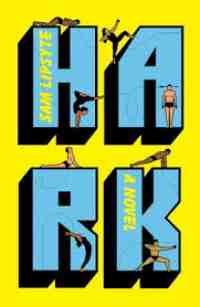Hark by Sam Lipsyte
 Wednesday, January 16, 2019 at 7:15AM
Wednesday, January 16, 2019 at 7:15AM 
Published by Simon & Schuster on January 15, 2019
At regular intervals, Hark made me burst into laughter because of its astonishing silliness. I love finding a novel that will do that. While Sam Lipsyte lost his way a bit in the last quarter of the story, the plot is only secondary to the wit. If you like clever goofiness for its own sake, you’ll probably enjoy Hark. Hardcore Christians, however, might find some of the humor near the end of the story to be distasteful, if not sacrilegious.
All of the characters in Hark are quirky. Hark Morner is sort of a self-help guru. His career began as a joke before he began to take it seriously. Inspired by a toy bow he found in the trash, Hark encourages people to think of themselves as archers shooting at targets. Mental archery is all about focus.
Fraz Penzig, having lost his teaching job, accompanies Hark on speaking tours when he’s not tutoring rich kids. He needs the idea of mental archery to give him hope in a dire world. Fraz is married to Tovah, but their relationship is troubled. Teal, who went to prison after playing Robin Hood with corporate funds, is now a therapist helping Fraz and Tovah with their marriage. Their domestic drama is an amusing diversion from the novel’s other amusing themes.
Kate Rumpler is one of Hark’s acolytes. Hark stays in her living space, although the nature of their relationship is ambiguous. They don’t have sex because sex would distract Hark from focus. Kate likes Harkism because she sees it as a tool rather than a philosophy, a way of achieving peace of mind that doesn’t yet invoke the tyranny of meditation or yoga.
Other characters want to monetize or market Hark. Some characters worship Hark; others hate him. Some place their faith in the power of mental archery in the way that some people place their faith in prayer; others have no faith in either one. Many believe that Hark has transformed their lives. Hark isn’t quite sure what to believe about himself. In fact, it is never quite clear from his speeches or notebook scribblings that Hark has any well-formed beliefs at all, which might make him the most honest character in the book. Still, his understanding of mental archery (and of himself) evolves during the course of the story.
The plot is silly in a way that is mildly twisted. I’m not sure that the chain of events recounted in Hark, from the musings of an angry catfish to the theft of bone marrow, even counts as a plot. The story takes a surprising turn with about a quarter of the novel remaining that eventually leads to a redefinition of Hark. It later becomes clear that the novel is taking place either in the future or in an alternate, war-torn present. Ironically, the novel loses its focus after the turning point. Lipsyte might have tried too hard at that point to be outrageous, but he still manages to deliver some laughs.
Hark touches upon moral issues, including whether turning self-help into a profit-generating enterprise is unethical, or whether it only seems that way to people who have adopted an outdated ethical model. “Ethics, after all, is merely a dance, a daring jig on morality’s wire, high above the lava lake of nihilism.” The book also raises questions about the nature of faith and belief, given how easy it is to eschew evidence in order to believe in a god, a healer, a shaman, a religion, or a self-help guru. Is one faith any less valid than any other, no matter how ridiculous it seems to people who have equal faith in something else that is equally untethered to evidence? Maybe faith qua faith has value even if the belief itself does not. Perhaps it is better to believe in something than to accept “the sour invitation to the void.” The novel makes no serious attempt to answer those questions. It chooses instead to be whacky and playful and that’s why I like it.
When Hark breaks down and babbles incoherently, people love him even more. And maybe that’s the point of the story. The idea of self-help, the idea that we’re doing something to improve ourselves by spending seven minutes listening to a lecture, might be more important to us than the actual self-help message, which we probably won’t internalize and might not even understand. Self-help messages can always be distilled to a few words — in Hark’s case, “You should focus” — and everything else is just salesmanship by “happiness hustlers” (a phrase coined by one of Hark’s acolytes). The pure form of a good idea is quickly commercialized and adulterated (who wouldn’t want an app that helps you focus?). Hark isn’t the only book to make that point, but it is one of the funniest.
RECOMMENDED
Reader Comments